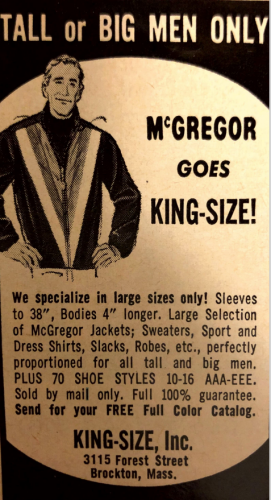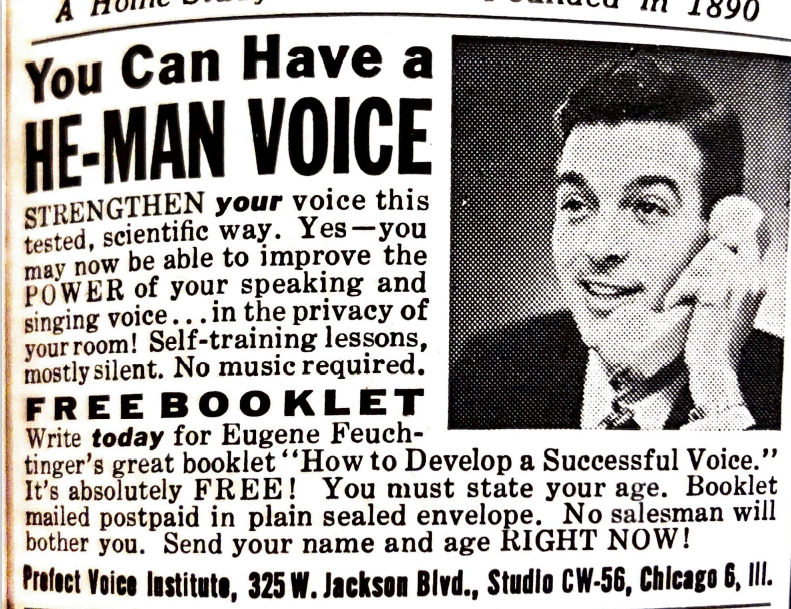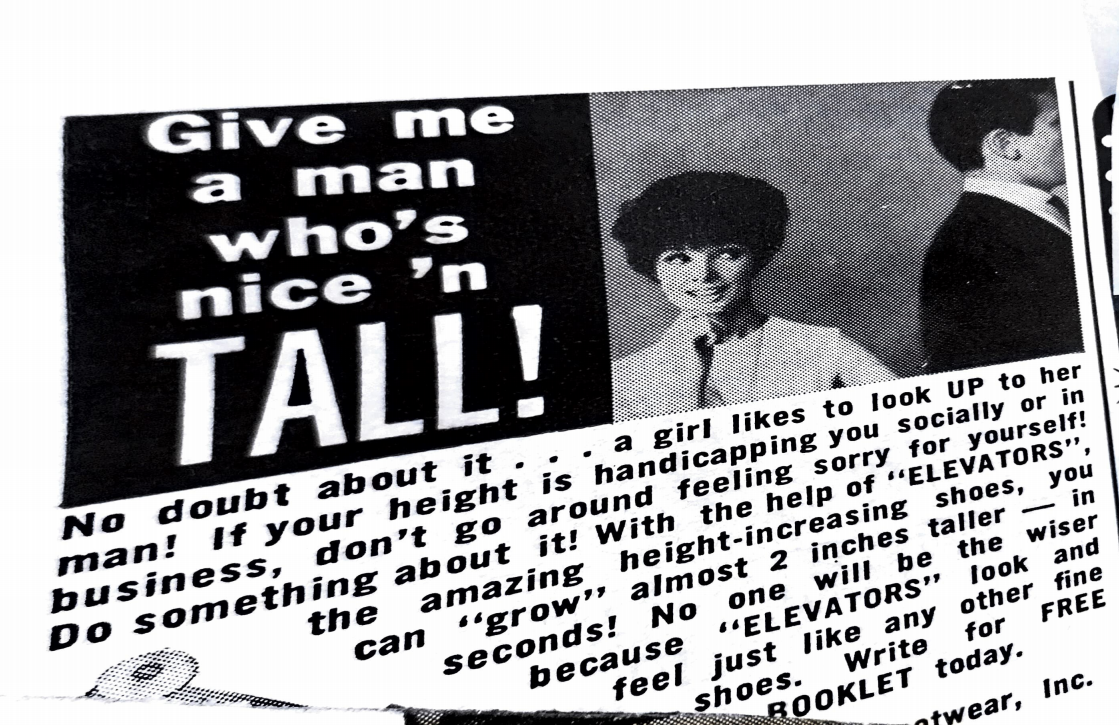22 Masculinity: Forced or Welcomed?
Katelyn Pipes
Introduction
What is Masculinity?
Every person has their own definition of masculinity. Let’s ask Google…
Mas-cu-lin-i-ty
noun
“Something traditionally considered to be characteristic of a male.”[1]
That seems pretty vague. Let me give it a try…
Mas-cu-lin-i-ty
concept
The idea that those assigned male at birth, not only must be, but are, strong, dominant, powerful, and emotionless.
At first glance, women are the ones who suffer from this concept of masculinity. However, I would argue that men suffer the most from these expectations. In order to do this, I chose four men that attend Wake Forest University, and showed them three ads published in Esquire magazine in 1963.
What is Esquire Magazine?
Esquire magazine is advertised as an American Men’s magazine and it was the first one of its kind. Additionally, it was arguably the first attempt at creating a male audience. Before Esquire, women were the only “consumers” while men produced. Before its creation in 1933, this idea of a male consumer was unheard of. Arnold Gingrich, Esquire’s founding editor, was searching for what this meant. How do you appeal to men? The answer was simple: women.[2]
Similar to its much more scandalous younger sibling, Playboy, Esquire readers were looking to be desired. They wanted a quick way to find women. But not just any woman. The one who is basically begging to be with them. In order to do this, they had to be attractive. They had to be tall, big, and, above all, powerful. Esquire did this, not only through its articles, but through its advertisements. Each one carefully picked. Placed perfectly on the page to make the reader think: “Do I need this?”
When the 1960’s man finished his hard day, he laid back, grabbed himself a drink and perhaps opened up Esquire. Here are some of the things that he saw.
The Ads
Ad 1: Tall or Big Men Only

Ad 2: You Can Have a He-Man Voice

Ad 3: Give Me a Man Who’s Nice’n Tall

The Men[3]
Each of these men remained anonymous except for six characteristics: class year, hometown, gender, race, sexual orientation, and their involvement with campus activities. I chose these men because they are all different in multiple aspects. They are not all white, straight, men from the Winston-Salem area. They each have their own unique pasts, upbringing and values.
It is important to identify some of their characteristics in order for this experiment to maintain its value. Not all men look at ads the same way. They do not (and did not) notice the same connotations and details of each one. And they will look at it differently than I did when I chose them.
Let’s meet them.
Male 1[4]
- Pseudonym[5]– Hugh
- Class Year-2023
- Hometown- Parkdale, Oregon[6]
- Gender- Male
- Sexual Orientation- Straight[7]
- Race- White
- Activities- Marching Band and Bio research
Male 2
- Pseudonym- Rhys
- Class Year- 2023
- Hometown- Fort Worth, Texas
- Gender- Male
- Sexual Orientation- Gay
- Race- White
- Activities- Student Tech advising committee
Male 3
- Pseudonym- Ray Summers
- Class Year- 2024
- Hometown- Rocksborough, NC
- Gender- Male
- Sexual Orientation- Heterosexual
- Race- African American
- Activities- Momentum crew (hip hop), young life (religious), marching band
Male 4
- Pseudonym- Sam
- Class Year- 2023
- Hometown- Chattanooga, Tennessee
- Gender- Male
- Sexual Orientation- Bisexual
- Race- Hispanic
- Activities- Marching Band, orchestra, wind ensemble
The Interview
Each of these men were interviewed in October 2020, during the COVID-19 pandemic. The interviews were all conducted via Zoom and recorded with each man’s permission to include their voice.
Each of the men were asked these same questions about each ad:
- What do you think these words would have meant to men in the 1960s?
- How would this ad be received today as compared to the time that it was created?
- Would you have bought this product?
- How would you react to this ad today? What would you change to make it more relevant?
but gave very different responses. Some of them took it very seriously. While others joked and laughed. I appreciated both responses. The former because this is a serious topic, and the latter because these ads do seem pretty ridiculous from a 21st century perspective. Now we will dive deeper into each ad and how these men responded to them.
Ad 1
A similar reaction about this ad was the consensus that it was emphasizing the power of being big. Or, as Hugh put it “glorifying the manly man type aesthetic”. However, they all also agreed that this one was not a “super inflammatory”[8] ad, and none of them would have personally bought it. Rhys points out that this ad is “marketed towards a niche” and he “doesn’t fit under that category.” And, as for Sam, he “would not care that much” if he saw this as in a magazine today. Okay. Fair.
But, Ray did have a problem with this one. He pointed out that the idea of having a store for only one type of person was the wrong way of going about this. This gave him the impression that the sellers were saying “If you don’t fit in, go somewhere else.” The word “King” in this ad, is specifically what gave him this impression. He feels that because these people are tall and big, they believe they are “higher than everyone else”[9].
After listening to the men talk about this ad, I was quite surprised that they had very few ill feelings about it. They all seemed to glance over it and explain it away quite easily. They were not offended, pressured, or hurt by it. It was simply a fact for them that this existed. Hugh even said he would “make the man larger” in order to get the point across. With the small addition of Ray’s differing opinion on the concept of a large men only store, they had little to no problems with this one. Ad number 2 was a different story.
Ad 2
All of the men had one problem or another with this ad. Sam’s first words were “Wow. Okay”. The idea of success that accompanied this made each of them noticeably uncomfortable. Hugh and Sam questioned the overall validity of the product itself. As far as Sam knows, “you can’t change your voice”. But, even if you could, none of them would have bought this product because they are happy with their voices. And “changing [Ray’s] voice won’t make [him] a more successful person”. As for the connotation of this ad and its suggestion of success, the men were pretty similar in their responses. They felt that it was ‘catering towards men who feel emasculated” and it is “a bit derogatory”[10].
The idea of needing a strong voice to be successful was not something they necessarily disagreed with, but the fact that the ad suggested a masculine and deep voice was where they had the problem. As Ray asked, “Why can’t we put a picture of a woman?”. And they disliked the suggestion of dominance or “power over people”[11] that was implied through the wording. When asked how they would change this ad Sam immediately replied “get rid of it” and I can’t say I blame him.
Ad 3
Ad 3 seemed to upset each of the men, especially the word handicapping. As Hugh said, “that’s a brutal one”. But what would it mean for someone to be handicapped in this context? Perhaps, being “caught behind”[12]? This fear of having everyone being taller than you seems to be the driving force behind this ad, and the men weren’t buying it. They saw it as “predatory”[13], “derogatory”[14], and just plain “rude”[15].
So, the wording really made them angry, but what about the picture? I was personally surprised at their lack of regard for it, after all, it was the main reason I chose this ad in the first place. It makes the obvious selling point of getting a woman with these shoes. Hugh did lightly touch on this, saying that he would prefer a picture of the shoes as opposed to “a woman with a flirty [facial] expression”. But the rest of the men mainly focused on the message of “inferiority”[16] that was portrayed, and the idea that in order to get a girl, you need to be tall. When I asked Sam why this was, he explained to me that “tallness is associated with attractiveness” and “people like pretty people.” After explaining all of this to me about why the product existed, the only man who said he would buy it was Hugh, though Ray greatly considered it. Rhys and Sam gave a strong no. So I wonder, who are these men that understand masculinity, can explain it, identify it, but (apparently) do not give into its selling points?
Conclusion
As a person who is obsessed with feminism, taking a step back and looking into the male perspective of masculinity was intriguing. It seemed to me that each of the men were affected differently from seeing these ads. Understandably, considering they are all so different. But, none of them were exactly comfortable talking about this. They were definitely struggling to explain these things because this is just the way things are. They don’t understand it just because they are men. They simply acknowledge that these are expectations that the world has for them. Whether or not they conform to them is a different story.
Hugh is happy with the way that he lives his life. This idea of masculinity is “hypothetical” to him. “Have confidence and you will appear more attractive to more people.”[17] He enjoys being more masculine and does not necessarily feel forced to do it. He wants to be strong. And don’t we all? I do not fault him for this.
As for Rhys, he is more aware of these pressures surrounding him as compared to Hugh. He was more amused by the ads than anything else. In fact ad 3 was “so predatory [he laughed] a little bit”. Rhys also sees hope for the future. He believed, while we have a ways to go, “the mold is expanding” and we continue to “decouple masculinity from being a man”. Rhys sees the pressures of masculinity in his everyday life, but I would argue that he sees no need to conform to them. He feels comfort in his own actions and personality. And just so everyone knows, Rhys would love to receive the product in ad number 3 as a gift!
Ray was the most offended out of all four men and felt ostracized and unrepresented in these ads. As he correctly pointed out, “all of these ads had white men in them”. The implied question of living in the 60’s during this interview, had a different meaning for Ray. Not only was he faced with talking about gender standards, but also racial stereotypes. But, just like Rhys, Ray sees change approaching. He feels that we are “shifting away from a masculine person being a white, tall, strong, man” and learning that “men come in all shapes and sizes”.
Sam definitely had the most fun. When I asked him why people wanted to be tall, he replied “easier access to higher shelves?”. But, this is who Sam is; he is a male who laughs in the face of masculine expectations. While he can explain them, they are ridiculous to him. As he points out, on the Wake Forest campus you can see a guy “wearing skinny jeans with painted nails and blue colored hair.” He encourages self expression and individuality as opposed to the distinct categories of masculine or feminine
As for me, I learned a lot through this process. These men gave me the hope that I think we all are looking for during this difficult time. We see that there are issues in our society, we have improved, and we are continuing to do so. So, for the main question of: Is masculinity forced or welcomed? I would say, the definition of masculinity itself is adapting. It is expanding, becoming less rigid and each man approaches the idea differently according to their own background. You do not have to be physically strong, dominant, emotionless, or even male to be masculine. Masculinity is changing for the better.
Katelyn is a student at Wake Forest, Class of 2023, majoring in Elementary Education and minoring in Politics and Creative Writing.
- www.dictionary.com. “Definition of Masculinity | Dictionary.Com.” Accessed November 5, 2020. https://www.dictionary.com/browse/masculinity. ↵
- Breazeale, Kenon. “In Spite of Women: Esquire Magazine and the Construction of the Male Consumer.” Signs: Journal of Women in Culture & Society 20, no. 1 (September 1994): 1-3. https://doi.org/10.1086/494952. ↵
- It is important to note that I do know each of these men. Some more than others. ↵
- I assigned these numbers to the males in the order that I decided to include them in the interview. ↵
- Each of the men chose a pseudonym for themselves. ↵
- Hugh is a member of a military family and only recently moved to Parkdale, Oregon. You can hear him hesitate during his interview when answering this question. He has also lived in Texas, and, most recently, in D.C.. ↵
- I typed these characteristics exactly how they described themselves to me in their interview. You will notice that Hugh described himself as “straight” while Ray described himself as “heterosexual”. I kept these the same because I wanted to respect their self identification. ↵
- Rhys ↵
- Ray ↵
- Rhys ↵
- Ray ↵
- Hugh ↵
- Rhys ↵
- Rhys ↵
- Ray ↵
- Ray ↵
- Hugh ↵

